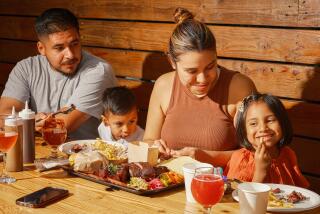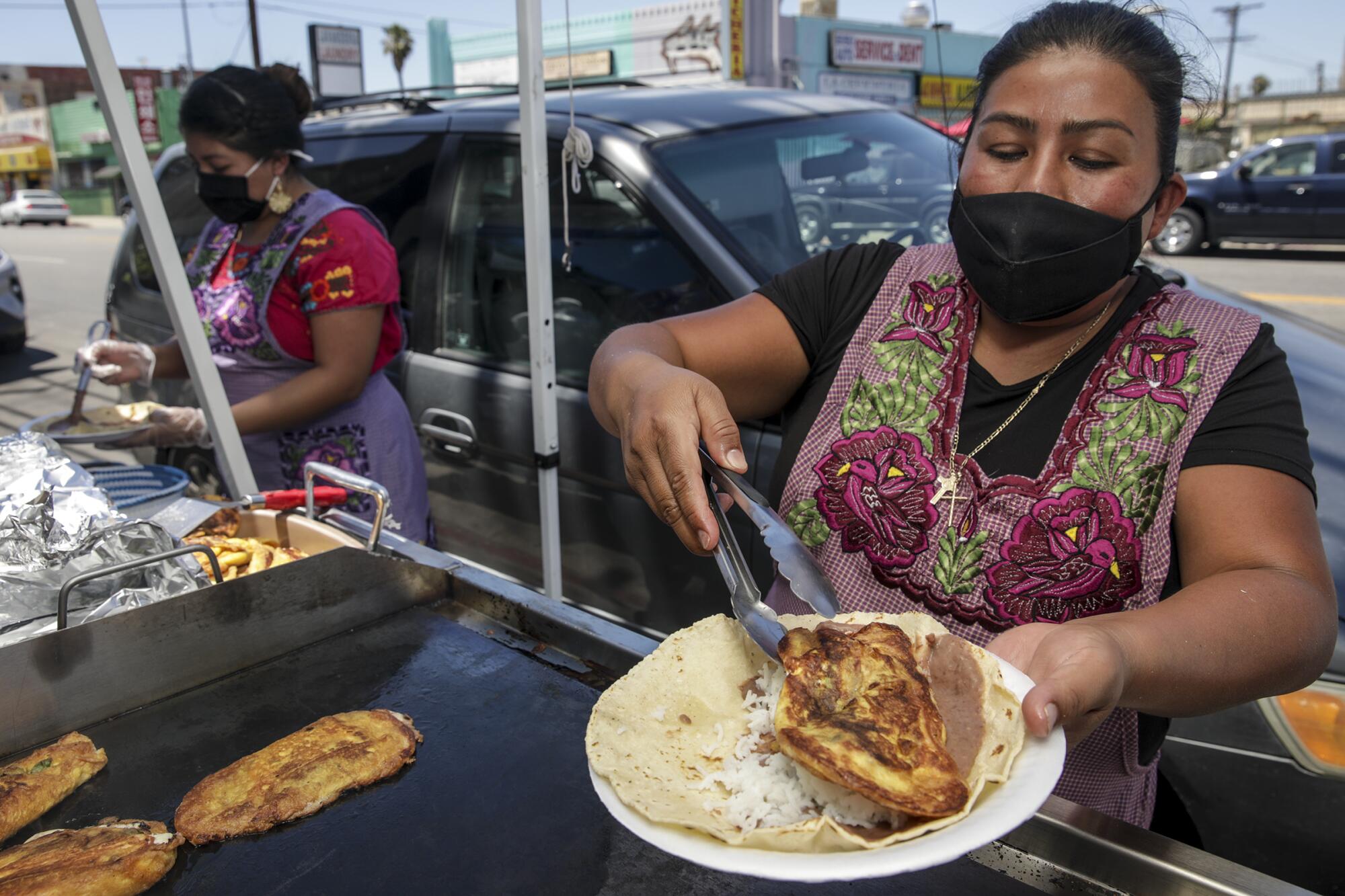
Last Saturday at the height of a scorching afternoon, Adela Ruiz and her husband, Paco, hopped out of their van and hurriedly set up a taco stand on Pico Boulevard in Arlington Heights. They were late.
He and a couple of friends raised a pop-up tent and unfolded a table on the sidewalk. She and her two daughters lugged out pots and trays filled with refried beans, rice, chiles rellenos and masa they had prepared back at their home in Garden Grove. Paco connected a flattop grill tank to a propane tank; Adela put on a beautiful pink-purple apron replete with embroidered roses and birds.
The couple, Zapotecs from the Mexican state of Oaxaca, were ready. Paco whipped out his smartphone, logged on to Instagram Live, and began to spiel.
“Pass by — free food!” he cheerily announced in Spanish. “We’ll wait for you here!” He zoomed in on Adela, who worked a tortilla press like a boss, as the youngest daughter also filmed on her smartphone. The earthy smell of slowly cooking masa filled the air. “Come here,” Paco added, “so these 100 chile rellenos can be finished!”
It was the third time in as many months that the Ruiz family had driven up from Orange County to hand out free, home-cooked food from this stretch of Pico. They did so as part of Mid-City Cookouts, a biweekly event that has Oaxacan street vendors give out free food to both promote their businesses and feed anyone who needs a warm meal.
But don’t call Mid-City Cookouts a charity — because organizers and participants don’t see it that way at all.
What they’re doing is the art of guelaguetza, a Zapotec word and concept most famous in Los Angeles as the name of a legendary Oaxacan restaurant. It actually refers to mutual aid, the idea that giving is as important as receiving — and that communities need to do both regularly to thrive.
“It’s something that we practice as Indigenous people, but now it’s about establishing it in the colonia [neighborhood] where we settled,” said Manny Mireles, whose family hosts Mid-City Cookouts in front of their flower and clothing boutique, Yeaj Yalhalhj. “We’d be doing it back home, so it’s important for us to now show the city that this is a network that has always existed.”
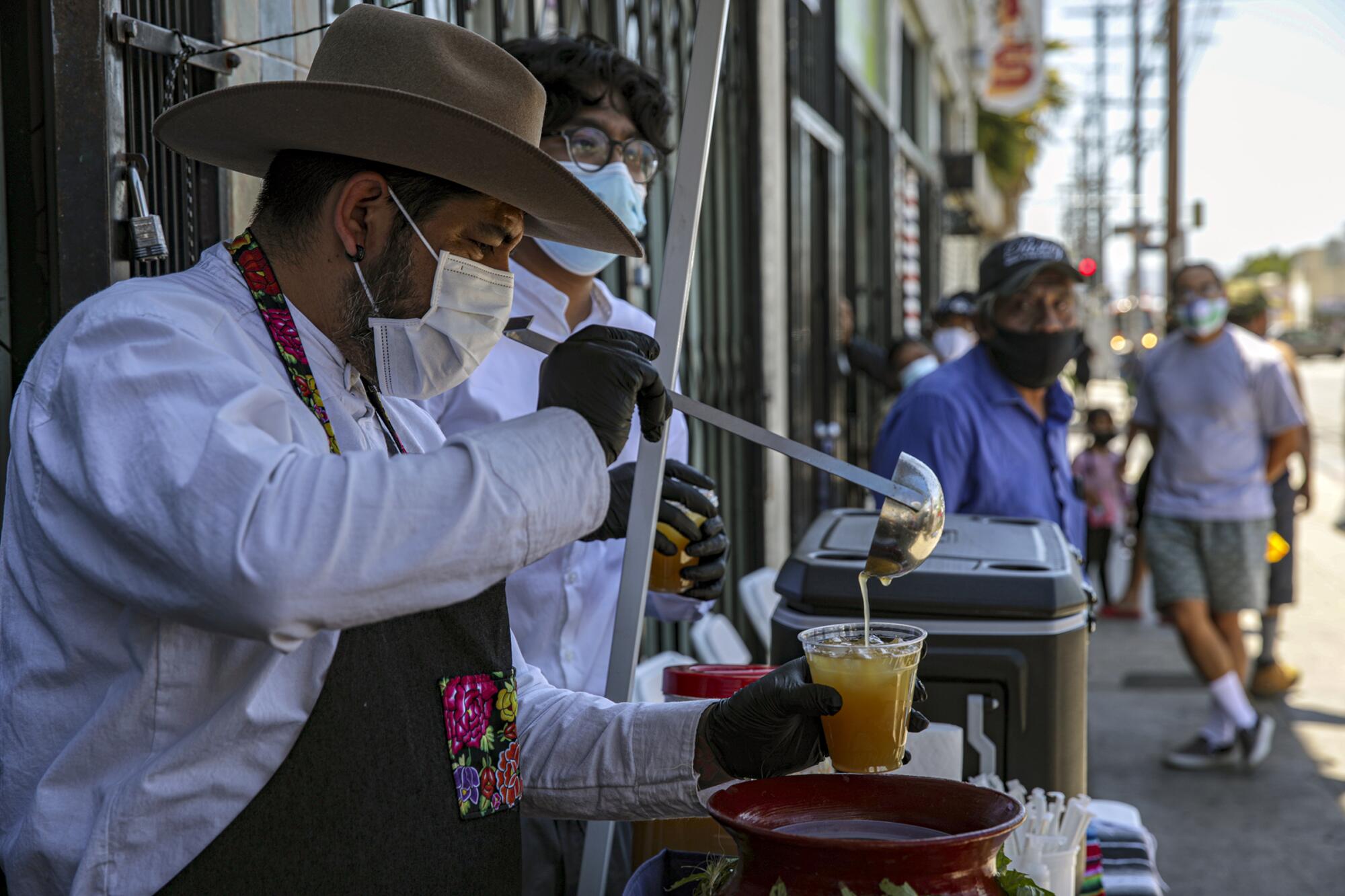
In L.A., Mid-City Cookouts’ version of guelaguetza raises funds online to pay vendors. Those vendors, in turn, use that money to import products from Oaxaca to not only make their traditional meals taste better, but to help local economies in their homeland. And eaters here learn about local vendors that they can patronize or hire for catering at a future date.
“We’re showing off our culture and gastronomy by helping people who need help now — and they get to learn about who we are,” said the 43-year-old Paco, as he finished off another video. “We’re doing this with love and ganas.”
If there was ever a year for guelaguetza in Los Angeles, it’s been this past one, especially for the city’s Zapotecs. They’re perhaps the largest Indigenous group from Latin America in Southern California, with an estimated population of over 180,000. Frequently discriminated against in Mexico and in the United States by their fellow Mexicans for their Indigenous heritage, local zapotecos banded together in 2020 to confront the coronavirus pandemic and the economic devastation it left in their community.
Activists collaborated with other Mexican and Central American Indigenous groups in the Southland on social media campaigns in their native languages to fight vaccine hesitancy. Nonprofits held food drives and handed out money to anyone who needed it.
But a big thing was missing from their efforts: festivals. Basketball tournaments and church festivals in honor of hometown patron saints were canceled. The local rendition of Oaxaca’s annual state fair — also called Guelaguetza — isn’t scheduled again until 2022. Imports from the state, the lifeline of Oaxacan restaurants in Southern California, slowed to a trickle.
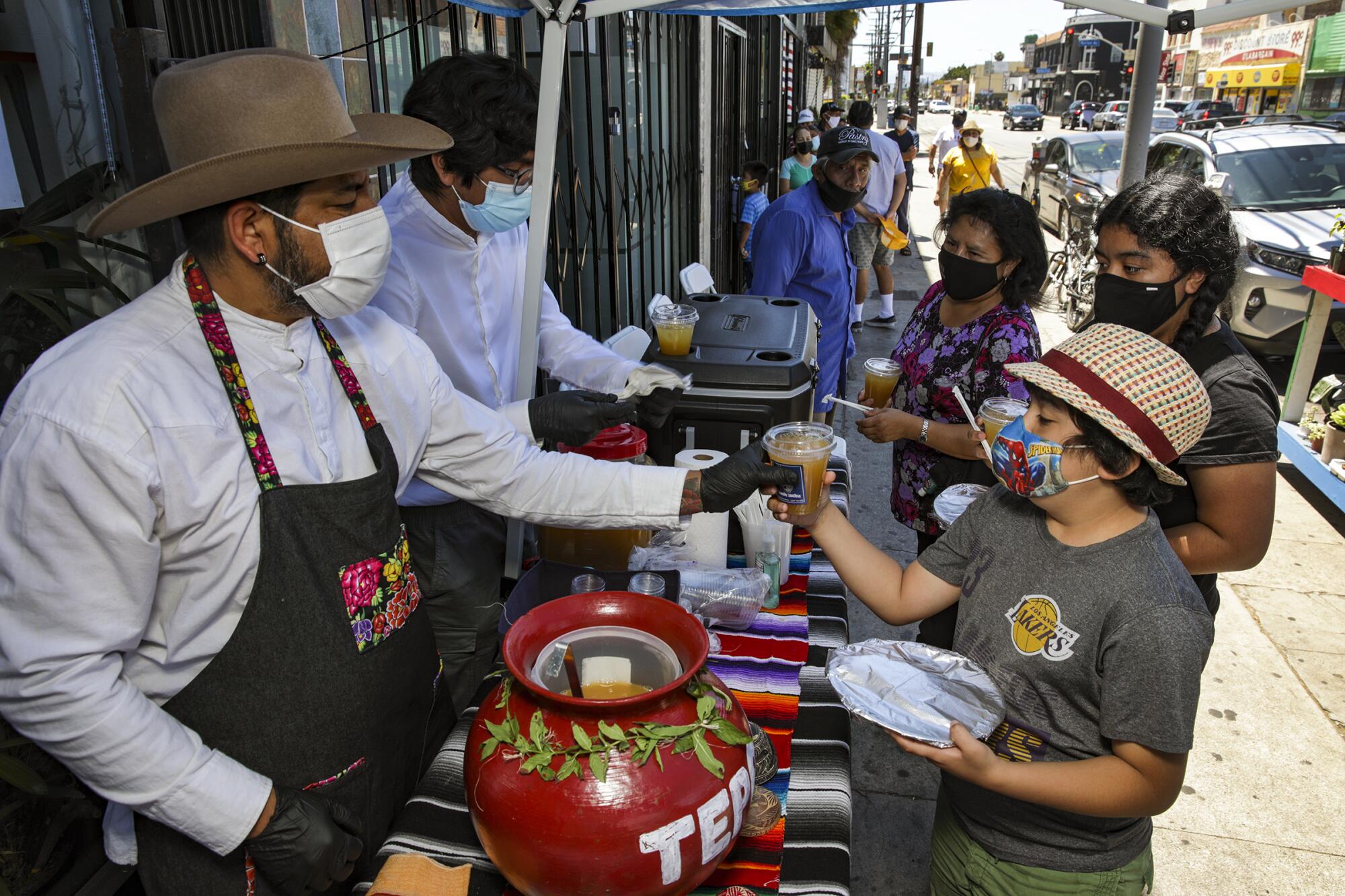
“We Oaxacans know how to celebrate,” said 56-year-old Vicente Ruiz, who owns a bicycle-repair shop. “Not being able to have fiestas was hard. That’s why [Mid-City Cookouts] is important.”
“It was about bringing joy to us,” said Mireles. He and others got the inspiration for Mid-City Cookouts from a similar effort in East Hollywood. But they wanted to focus on fellow zapotecos, in a city that too often overlooks them. “We want to be visible as Indigenous people. We want to see ourselves.”
There have been 12 Mid-City Cookouts so far, and vendors get paid around $700 per session. What used to be weekly events are now biweekly, because funds are beginning to dry up for reasons Mireles can’t quite gauge. But the spirit of this mini-guelaguetza easily spreads to those who participate.
The Ruiz family have run their catering operation for three years. The pandemic slowed orders, so they would’ve never thought of giving away their grub for gratis. But Mid-City Cookouts “opened our eyes,” Paco said, “to be able to help others and ourselves.”
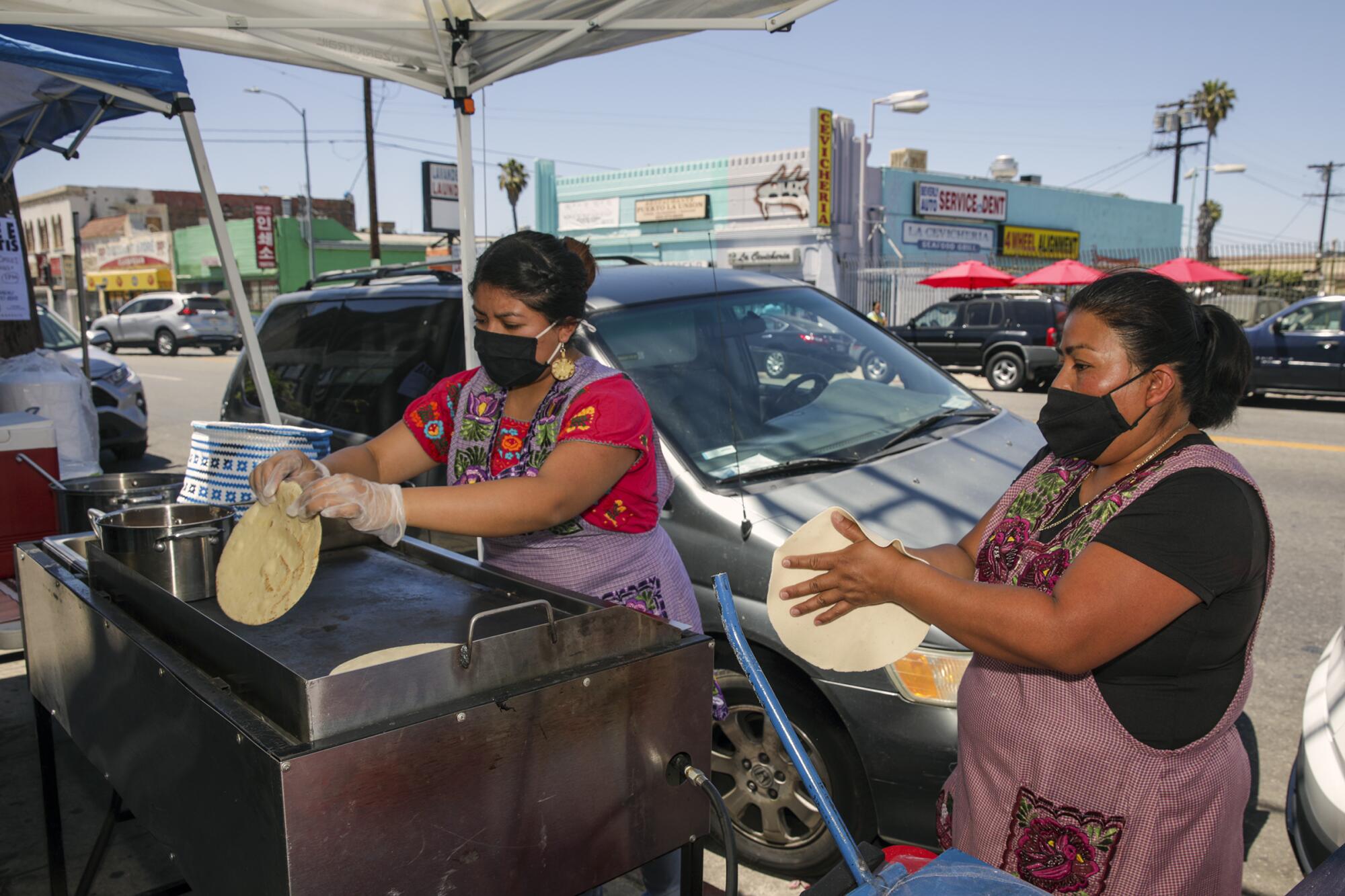
A couple of blocks away, Melina Cruz Bautista and her sister organize grocery giveaways from their mother’s dry cleaner. She was in Yeaj Yalhalhj’s small gallery to set up for a reception later that afternoon for her photographs of Los Angeles and Oaxaca.
“What I do is in gratitude of the community that has seen me grow up,” said the 23-year old, who also records a podcast with her sister about their activism. “L.A. is changing, so our generation of Oaxacalifornia [a portmanteau of Oaxaca and California] needs to make it so that people listen to us instead of talking for us.”
Outside, Joe Nankin stocked a community fridge with bags of Brussels sprouts, bread and Samoas Girl Scout cookies. He had originally come to Mid-City Cookouts as an eater but quickly became a volunteer.
“You hear about handing out free food but not so much about mutual aid,” said the 31-year-old. “The person who you feed can help you, too. It’s not just about feeding people but getting economically involved.”
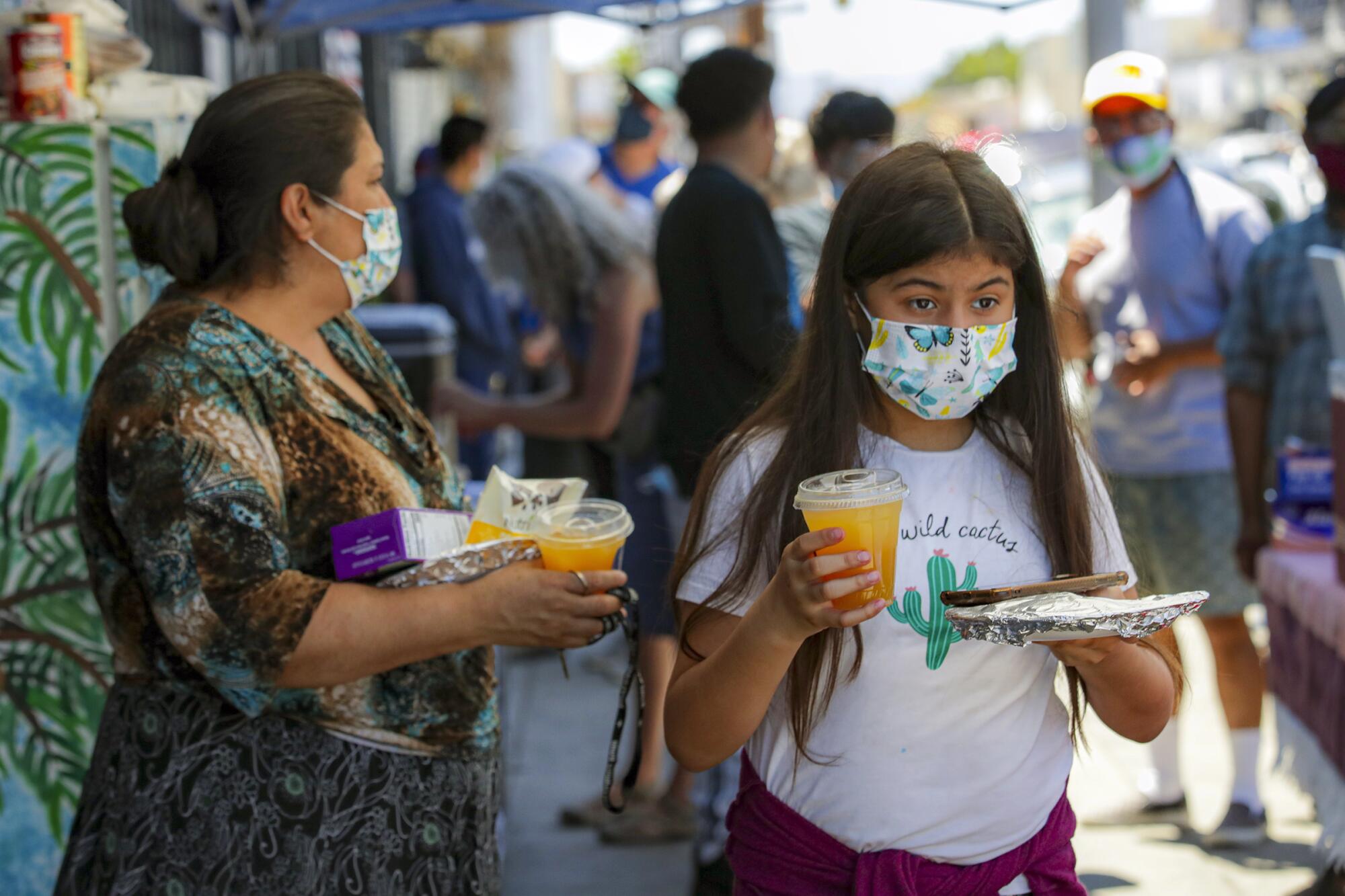
Just across the way from the Ruiz taco stand, Alex Lopez mixed a giant clay jug filled with tepache, a fermented pineapple drink. He had lost his job as a restaurant worker last year, so he began to sell tepache door to door to make ends meet. When he heard about Mid-City Cookouts, the 39-year-old tried to approach the organizers for a gig only to have Mireles invite him first.
Today, Lopez was handing out his tepache for free, declining any payment from Mireles for his service.
“Oaxacan or not, we want to help everyone,” he said. “Like they say, ‘Organize, and help.’”
By then, a hungry, thirsty line of Oaxacans and other Mexicans, Koreans and whites was ready for their free meal and drink. Mireles handed out Lopez’s tepache and Adela’s tacos de chile relleno made from chile de agua, a pepper unique to Oaxaca. “They’re not too spicy today,” she said with a laugh. “Probably because I wasn’t angry when I made them!”
A friend sidled up next to her to make tacos faster. Lopez poured out more tepache. Paco filmed this mini-guelaguetza and urged his viewers to come. Then, a happy eater jumped in front of his camera. “Sorry I’m late,” the woman said. Paco smiled.
“Tarde pero seguro,” he said. Better late than never.
More to Read
Sign up for Essential California
The most important California stories and recommendations in your inbox every morning.
You may occasionally receive promotional content from the Los Angeles Times.


